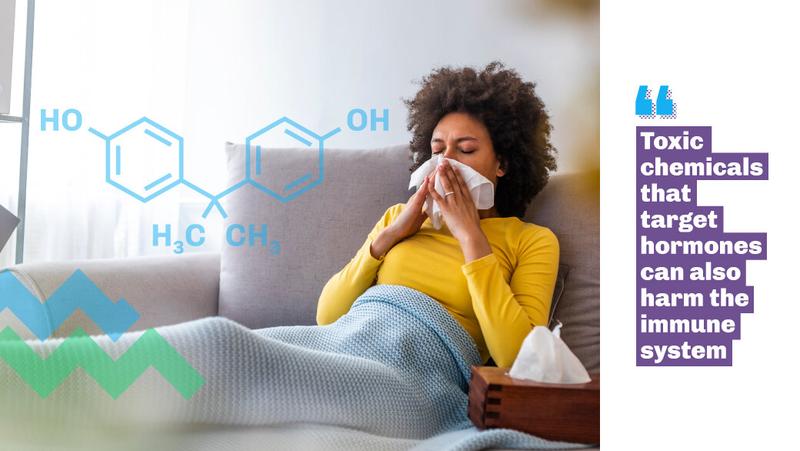What is the Immune System
The immune system is a network within the body that protects us against disease. It fights off viruses and bacteria that can make us sick. It helps us recover when we are sick or injured.
The COVID-19 pandemic has highlighted the concept of immunity. To be immune against a bacteria or virus, a person must have antibodies in their blood.
Antibodies are tiny molecules made by white blood cells. When foreign objects, such as viruses, get into your body, antibodies bind to them to help destroy them.
Antibodies are specific. Each type of antibody recognizes a particular virus or type of bacteria.
To be immune to a disease, a person must have already been exposed to that virus or bacteria. Exposure can occur through a vaccine or by having (and recovering from) a specific cold, flu, or illness.
The Immune Response
When infected with a foreign object, the immune response kicks in. Depending on the type of attack on the body, the immune system reacts in different ways.
Common immune responses include:
- Coughing
- Sneezing
- Swelling/inflammation
- Scabs
An Unhealthy Immune Response
There are several ways the immune system can “misfire” or not behave properly.
The immune system is usually able to detect the difference between the body’s own cells and harmful bacteria or viruses. But sometimes an immune system response can be unwanted or sub-optimal.
Allergies. The body can perceive things like dust, mold, and pollen as “foreign invaders.” In this case, it can overreact and mobilize an immune response. This can cause sneezing, itching, and watery eyes.
Autoimmune disease. The immune system can start treating its own cells as foreign objects and attack them. The body can attack certain organs or systems. Rheumatoid arthritis and lupus are examples.
Weak immune system. Some people have a weak immune response, even to unwanted invaders. This can be due to diseases (cancer, HIV), malnutrition, or other reasons. Some people may not even know their immune systems are weak. They may frequently contract diseases such as bronchitis, which other people can fight off.
Toxic Chemicals and the Immune System
There are ways to boost your immune system, such as sleep and a healthy diet. But there is another factor that is less well known when it comes to a healthy immune response.
Toxic chemicals, such as hormone-mimicking chemicals, have been shown to harm the immune system. These chemicals, including BPA and phthalates, are present in everyday products.
It might be surprising that toxic chemicals that target hormones can also harm the immune system. But these chemicals have been associated with:
- Allergies
- Asthma
- Autoimmune diseases
- Altered immune cell response
- Suppressed immune system
- Increased likelihood of contracting disease
And exposure during pregnancy or childhood can cause greater harmful effects.
Toxic Chemicals and COVID-19
With the crisis of COVID-19, many researchers have called for reducing toxic chemical exposures. Toxic chemicals can harm the immune system and cause chronic disease. These conditions can increase deadly cases of the virus.
These scientists warn that the continuing epidemic of chronic disease will make this and future pandemics much worse. And this plague of chronic disease is due to toxic chemical exposures.
How are we exposed to immune damaging toxic chemicals?
Toxic chemicals like BPA and phthalates that can harm the immune system. They can be found in:
- Plastics labeled with the #3 or #7 recycling mark
- Food and drink can linings
- Dental sealants
- Receipt paper
- Personal products such as shampoo, lotion, sunscreen, etc.
- Cosmetics, fragrances, perfumes, and air fresheners
How to Avoid Toxic Chemicals
We know that toxic chemicals can have harmful effects on the immune system. They can cause asthma, allergies, and increased risk of getting sick.
It can be hard to avoid exposure to toxic chemicals because we find them in everyday products. You can lower exposure from personal products by shopping from our Approved Product List.
You can also get tested to see if you are being exposed to toxic chemicals. Our test can help you identify daily sources of toxic exposures and reduce them.
Jenna Hua, RD, MPH, PhD, is the founder of Million Marker, a service for people to measure personal exposure to everyday environmental chemicals in their body. Jenna is a registered dietitian and environmental health scientist by training, Jenna’s past research has focused on how our surrounding environment impacts our behaviors and health. An ardent believer in disease prevention, she wants to provide personalized preventive strategies to everyone to lead a healthier life.
Link to Original Post: https://www.millionmarker.com/blog/can-toxic-chemicals-harm-your-immune-system

